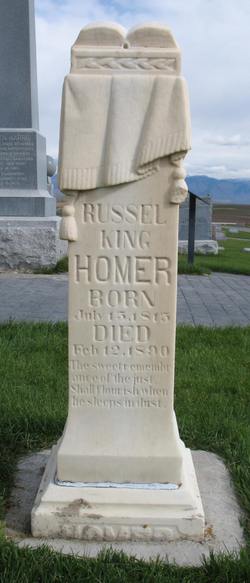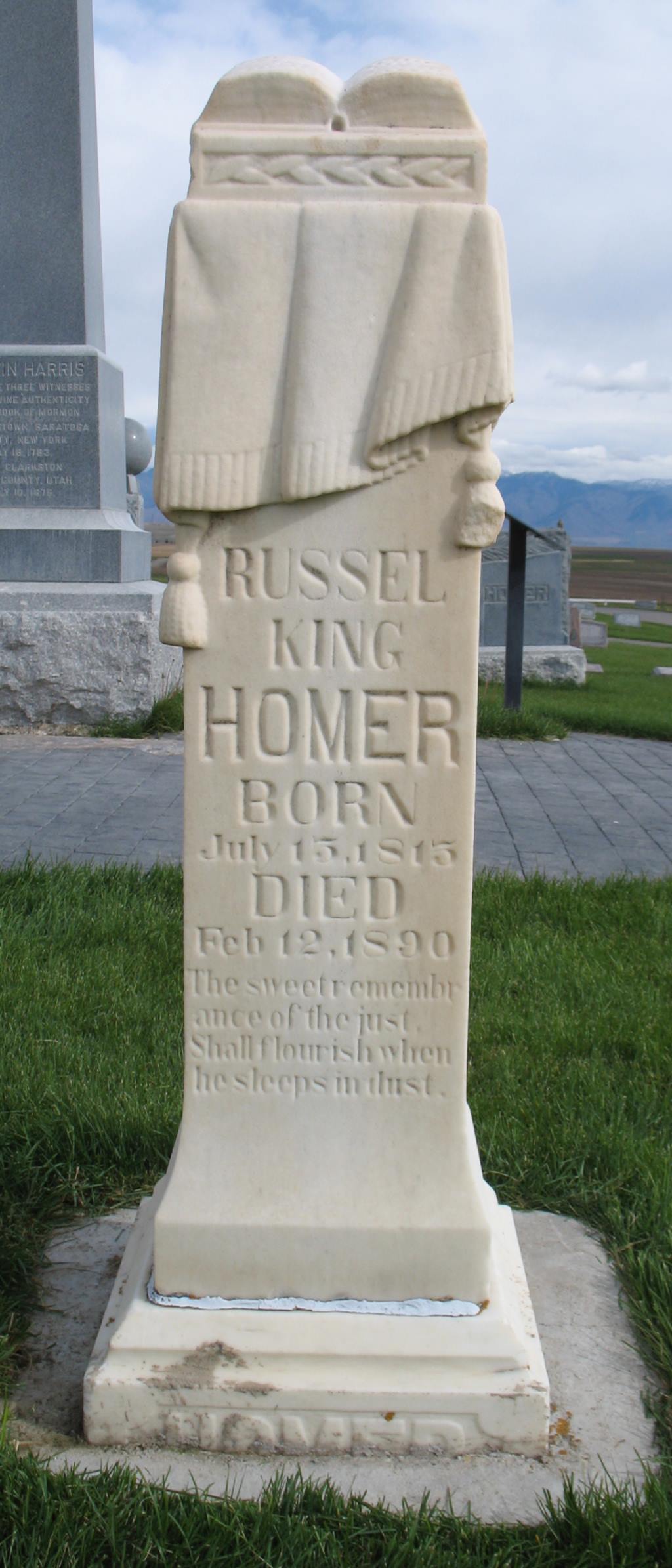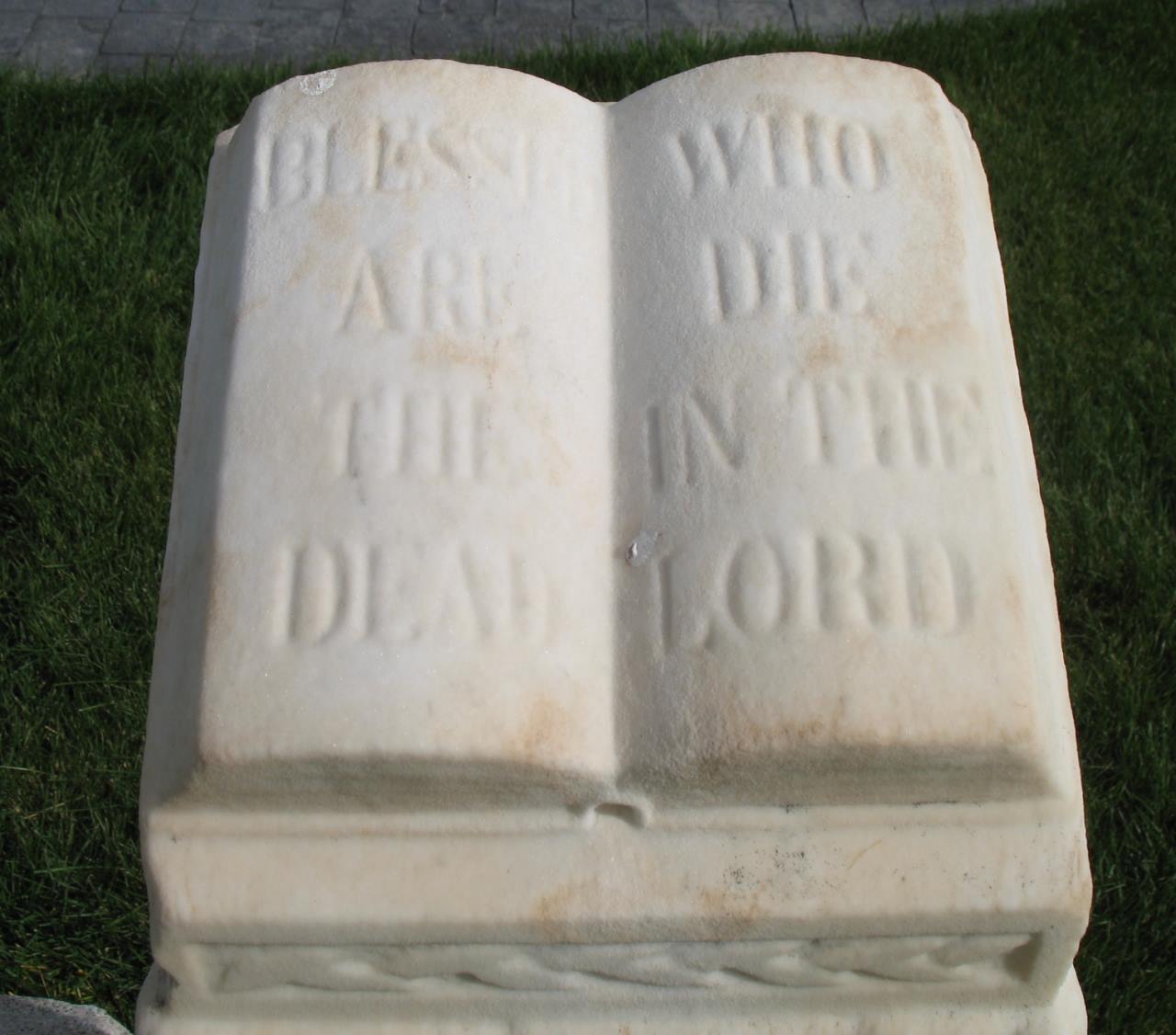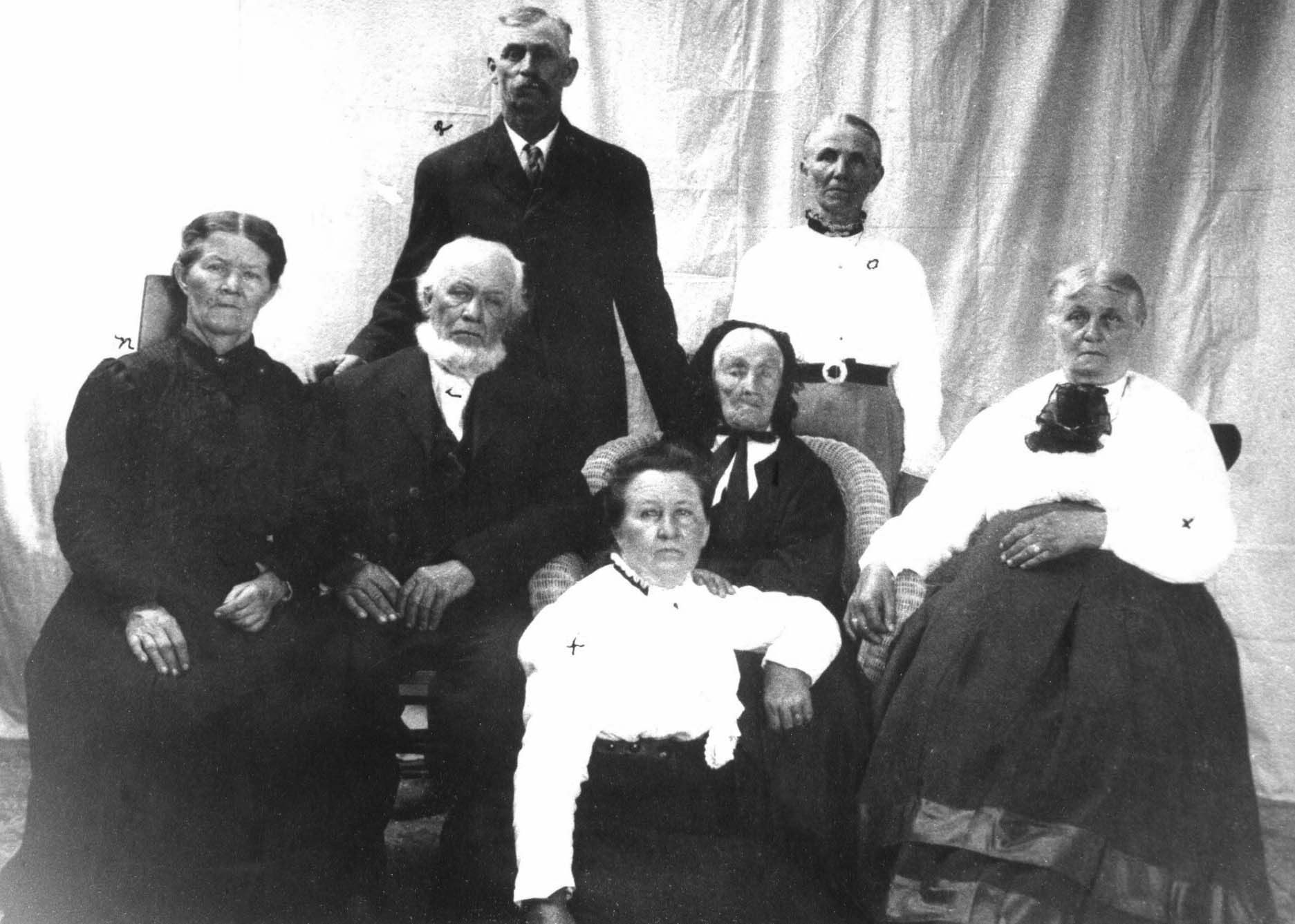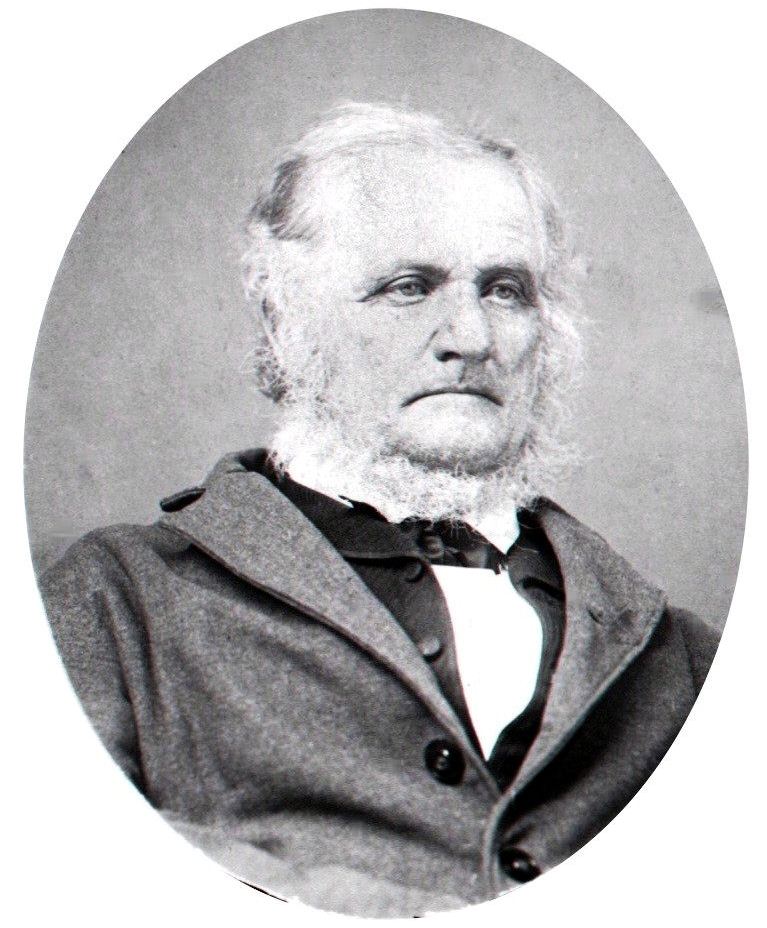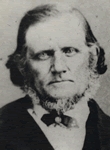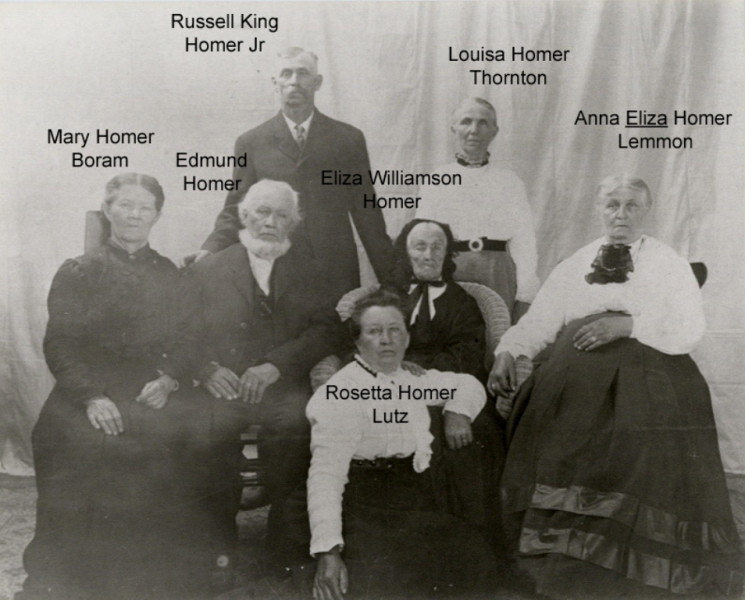Married Eliza Williamson, 20 Dec 1836, Springfield, Erie, New York
Married Eliza Thornton, 29 Mar 1860, Salt Lake City, Salt Lake, Utah
Married Mary Caroline Andersen, 24 Nov 1860, Salt Lake City, Salt Lake, Utah
Married Mary Pryann Petty, 23 Nov 1867, Salt Lake City, Salt Lake, Utah
Our Pioneer Heritage, Vol. 2, p. 46
On July 15, 1815 a son was born to Benjamin Cobb and Anna Warner Homer in Oneida, Onondaga County, New York. He was named Russell King. When Russell was fifteen years of age his father took the family to Crawford County, Pennsylvania, where he secured a homestead. At the age of twenty-one Russell returned to New York and married his childhood sweetheart, Eliza Williamson. They returned soon after to Pennsylvania where they took up farming as a means of livelihood.
The young couple became interested in the Mormon religion and moved to Kirtland, Ohio. On March 21, 1845 Russell was baptized in the temple in Nauvoo, Illinois. When the pioneers were preparing to come to Utah in 1847, Russell took his team, wagon and supplies for himself and family and also for a neighbor, A. Williams, and joined them. However, they were longer getting ready to start than was expected, and after waiting two weeks Heber C. Kimball came to Russell and said, "Brother Homer, you are just the man we need to stay here and inspect all the horses and cattle that start across the plains and see that none start that may not be able to make the trip. We also want someone to look after the Church cattle and as your family are sick and need you, you had better stay and attend to that business and let Brother Williams drive your team across the plains to Utah." This plan was followed and Mr. Williams returned the outfit the next year.
For the next two years Mr. Homer carried on his responsibilities. In the spring of 1849 he signed a contract to deliver to Salt Lake City merchandise for Livingston and Kincaid. With his brother, Benjamin, and seven others, he loaded seven large wagons and came to Utah for the first time. The return journey was made in the late fall. Orson Hyde was one of the company starting on his mission to Palestine. Orson Pratt was also one of the company going to New York on Church business. While on the homeward journey Russell contracted pneumonia from which he never fully recovered. After a long illness he moved west again to a small village called Bethlehem on the east bank of the Missouri River and went into the mercantile business.
For two years Mr. Homer carried on in this line of work, then upon learning of the death of his father in Pennsylvania he sold out and moved back to his old home. After the estate was settled he took his family to Pottawattamie County, Iowa where they farmed until 1856, when they moved to Crescent City, Iowa and opened a hotel called the Homer House. During the winter of 1857–58 he and his wife made a home for all returning Elders who had been recalled to Utah on account of the Johnston Army episode. As many as forty missionaries sat down to their table at one time, fifteen stayed all winter. They were John Wakely, Henry Yates, Milo and James Andrus, Benjamin Cluff, Samuel Atkins, John Gleason, Ephraim Hanks, George Goddard, Felshaw Brooks, Charles and Andrew Shumway, Abraham O. Smoot, Sam Riter and a Mr. Lee. He furnished supplies for all these Elders when they left for Utah.
On the 3rd of July, 1858, a company of immigrants and returning missionaries started from Florence, Nebraska to Salt Lake City. Russell Homer was appointed captain and Christian Fjelsted chaplain and president of the Saints. Russell was general director and he had a light wagon for his family and also three additional wagons loaded with merchandise. The company, most of them from Denmark, was well equipped and they made good time all the way. At times they met hostile Indians and many wagons hauling provisions to Utah to supply Johnston's army which had passed along that route the fall before. They entered Salt Lake Valley October 6, 1858 without the loss of a single life, either human or livestock.
The following spring he, with his son Edward, again crossed the plains to dispose of the remainder of his property. After his arrival in Utah for the third time he moved to Peoria on the Weber River and was the first justice of the peace in that part of the country. He helped to pioneer and develop many communities in Utah. His last years were spent in Clarkston, Cache County, where he engaged in farming and cattle raising. He passed away in that city, February 12, 1890 at the age of 75 years. Eliza died in Blackfoot, Idaho, June 11, 1912.
Married Eliza Williamson, 20 Dec 1836, Springfield, Erie, New York
Married Eliza Thornton, 29 Mar 1860, Salt Lake City, Salt Lake, Utah
Married Mary Caroline Andersen, 24 Nov 1860, Salt Lake City, Salt Lake, Utah
Married Mary Pryann Petty, 23 Nov 1867, Salt Lake City, Salt Lake, Utah
Our Pioneer Heritage, Vol. 2, p. 46
On July 15, 1815 a son was born to Benjamin Cobb and Anna Warner Homer in Oneida, Onondaga County, New York. He was named Russell King. When Russell was fifteen years of age his father took the family to Crawford County, Pennsylvania, where he secured a homestead. At the age of twenty-one Russell returned to New York and married his childhood sweetheart, Eliza Williamson. They returned soon after to Pennsylvania where they took up farming as a means of livelihood.
The young couple became interested in the Mormon religion and moved to Kirtland, Ohio. On March 21, 1845 Russell was baptized in the temple in Nauvoo, Illinois. When the pioneers were preparing to come to Utah in 1847, Russell took his team, wagon and supplies for himself and family and also for a neighbor, A. Williams, and joined them. However, they were longer getting ready to start than was expected, and after waiting two weeks Heber C. Kimball came to Russell and said, "Brother Homer, you are just the man we need to stay here and inspect all the horses and cattle that start across the plains and see that none start that may not be able to make the trip. We also want someone to look after the Church cattle and as your family are sick and need you, you had better stay and attend to that business and let Brother Williams drive your team across the plains to Utah." This plan was followed and Mr. Williams returned the outfit the next year.
For the next two years Mr. Homer carried on his responsibilities. In the spring of 1849 he signed a contract to deliver to Salt Lake City merchandise for Livingston and Kincaid. With his brother, Benjamin, and seven others, he loaded seven large wagons and came to Utah for the first time. The return journey was made in the late fall. Orson Hyde was one of the company starting on his mission to Palestine. Orson Pratt was also one of the company going to New York on Church business. While on the homeward journey Russell contracted pneumonia from which he never fully recovered. After a long illness he moved west again to a small village called Bethlehem on the east bank of the Missouri River and went into the mercantile business.
For two years Mr. Homer carried on in this line of work, then upon learning of the death of his father in Pennsylvania he sold out and moved back to his old home. After the estate was settled he took his family to Pottawattamie County, Iowa where they farmed until 1856, when they moved to Crescent City, Iowa and opened a hotel called the Homer House. During the winter of 1857–58 he and his wife made a home for all returning Elders who had been recalled to Utah on account of the Johnston Army episode. As many as forty missionaries sat down to their table at one time, fifteen stayed all winter. They were John Wakely, Henry Yates, Milo and James Andrus, Benjamin Cluff, Samuel Atkins, John Gleason, Ephraim Hanks, George Goddard, Felshaw Brooks, Charles and Andrew Shumway, Abraham O. Smoot, Sam Riter and a Mr. Lee. He furnished supplies for all these Elders when they left for Utah.
On the 3rd of July, 1858, a company of immigrants and returning missionaries started from Florence, Nebraska to Salt Lake City. Russell Homer was appointed captain and Christian Fjelsted chaplain and president of the Saints. Russell was general director and he had a light wagon for his family and also three additional wagons loaded with merchandise. The company, most of them from Denmark, was well equipped and they made good time all the way. At times they met hostile Indians and many wagons hauling provisions to Utah to supply Johnston's army which had passed along that route the fall before. They entered Salt Lake Valley October 6, 1858 without the loss of a single life, either human or livestock.
The following spring he, with his son Edward, again crossed the plains to dispose of the remainder of his property. After his arrival in Utah for the third time he moved to Peoria on the Weber River and was the first justice of the peace in that part of the country. He helped to pioneer and develop many communities in Utah. His last years were spent in Clarkston, Cache County, where he engaged in farming and cattle raising. He passed away in that city, February 12, 1890 at the age of 75 years. Eliza died in Blackfoot, Idaho, June 11, 1912.
Family Members
-
![]()
Edmund Homer
1839–1916
-
![]()
Nancy Ann Homer Harris
1841–1876
-
![]()
Anna Eliza Homer Lemmon
1843–1911
-
![]()
William Harrison Homer
1845–1934
-
![]()
Lovisa Matilda Homer Thornton
1848–1935
-
![]()
Benjamin John Homer
1853–1894
-
![]()
Mary Ann Homer Boram
1854–1930
-
![]()
Rosetta Katherine Homer Lutz
1857–1923
-
![]()
Russell King Homer Jr
1859–1940
-
![]()
Marinda Thornton Homer Jardine
1861–1923
-
![]()
Emily Jane "Ginnie" Homer Jardine
1861–1931
-
![]()
Joshua Thornton Homer
1863–1921
-
![]()
Delania Homer Cooper
1863–1943
-
![]()
Esther Homer Stokes
1865–1928
-
![]()
Sarah Homer Clark
1865–1947
-
![]()
Rebecca Homer Costley
1868–1948
-
Delight Homer
1869–1870
-
![]()
Rachel Maretta Homer Crockett
1870–1950
-
![]()
Parley Pratt "Cap" Homer
1871–1935
-
![]()
David Homer
1873–1897
-
![]()
Louisa Homer Peterson
1873–1941
-
![]()
George Homer
1875–1875
Advertisement
Records on Ancestry
Sponsored by Ancestry
Advertisement
